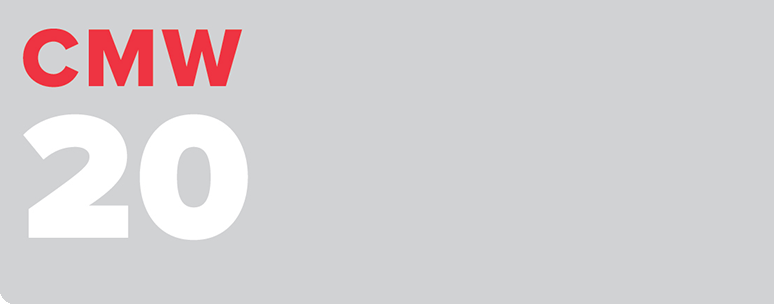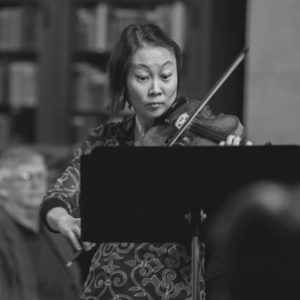Minna Choi
Minna Choi began studying the violin at age 7. But she didn’t fall in love with the instrument until high school, thanks to a Anne-Sophie Mutter recording of a Mendelssohn violin concerto and a happy experience playing chamber music at summer camp. At Brown University, she joined a quartet and began playing music with Sebastian Ruth, never expecting the violin to become a career path. The rest is Community MusicWorks’ history. Today, Minna is the Fellowship Program Director and continues to play violin with the MusicWorks Collective. She has a master’s in violin performance from Hartt School of Music and has performed with numerous regional orchestras.
Looking back at my teenage self as a 42 year old, I know that I had a meandering path. It took me a long time to find my voice and what was really most important to me. I spent freshman year at Oberlin and then transferred to Brown. Because I came as a transfer student, and because of the way Brown is structured, unless you are a self-starter, it’s easy to get a little bit lost. I was trying to figure out, “What do I actually want to do with my life?” and just trying a little bit of this, a little bit of that. After college, I decided to try music but felt disenchanted. I moved back to Providence and I was teaching privately and with the (RI Philharmonic) Music School. And then midway through the year Sebastian says, “Hey, I think we’re going to start giving lessons at the West End. Do you want to do this with me?” And so I thought, “Sure.”
Before you really have found yourself and your career, you realize community is not just readymade. It’s not a given, and it can be very isolating and lonely to feel like you’re one person doing something, not even sure that it’s the right thing or that it’s what you want to be doing. Community is something that you have to be active about seeking out. I’m an introvert. It’s not my choice to go put myself in a big crowd of people. I like being quiet and being by myself, but there’s a balance. Too much of that feels like not a good thing. As this organization has grown, these concentric circles of community have expanded. There’s a web of connections – parents, students, all the musicians who are involved, all the community partners. It’s an amazing web of relationships, and I think the value is that you don’t have to feel like the one person who’s trying to make things happen.
The community feeds me–the relationships with students, with parents, with colleagues. And you know, I taught at a music school, I taught at a public school, and it’s really different to feel so closely connected to colleagues and to be able to talk about your teaching frustrations and challenges and to work with those same people on music.
As a young teacher, there are probably a lot of mistakes I made along the way just because I didn’t have years of working with kids and figuring out how to teach this highly skilled instrument. That’s the thing. We’re taking this body of work–this music–and wanting to expose young people to it, but with it comes a very mechanical and highly specialized skill-base. Sometimes kids are naturally good at it and for others, there are barriers, right? And there’s tension and it’s awkward.
The subject matter is learning how to play the violin but the actual teaching is so much more. That’s not to say, “Oh, I don’t care about how my students play,” because I do. As I got more experienced I realized it was much more of seeing where the student was and what they were bringing and how to work together towards building the skills and learning how to hear and play and sing music. I came to the realization that we’re a community of learners. We’re all on this long trajectory of working towards getting better and becoming more whole as a musician and also connecting the pieces–the piece of our self to what we play, to what we do with our hands.
I’ve had the experience of feeling like I can’t do something and then, either with support from mentors or peers–going for it–and then the feeling of, oh! achieving it. It changes your whole feeling about yourself and what you’re capable of. It is something that comes up again and again in teaching music. Kids will say, “I can’t do this” or “I won’t” because it’s hard and it doesn’t sound good. You’re slogging through and it’s just not getting better; it’s not steady progress. It definitely plateaus and it dips, and then there’s a leap forward or there’s some inspiration. Something about that experience carries over into kids’ ideas about themselves and what they are capable of.
I can think of a very concrete example of working with a student in this way–Alondra. She is such an amazing human being. I only worked with her for two years. She was really fun to teach just because she was so interested and lit up by music. She had chosen a piece and it was really hard. It had a lot of technical challenges. I had brought her a few different things and we read through them, and she said, “That’s the one I want to play!” I think it was the Hungarian dance. She would come back week after week saying “Oh, this one part, I just can’t get it.” But she was so determined.
In telling it, it seems like a straight shot and it wasn’t quite that. One of the reasons I really enjoyed working with her and felt sad that it was such a short time was that over the two years there was a change in her as a person: she found a quiet confidence. It wasn’t even so much about the performance—she played it and she played it beautifully, and she was very proud of herself and I was proud of her too—it was the lessons leading up to it and the process of her recognizing that she could do something, of just believing that she could, and discovering that for herself. So those are the moments.
As a teacher you’re pouring so much energy into guiding a young person and sometimes you’re wondering: “Am I doing this the right way? Do they even want this?” When you’re deep down in the thick of it, it’s, “Nope, nothing’s happening, nothing’s moving.” But then there are those other moments, and it’s not even about how well she played it. It’s really about the confidence that is going to stay with her into her adult life. This is one example that comes to mind, and I’ve probably embarrassed her by telling it, but really it’s a similar story with each student I’ve worked with over the years. Everyone is on their own trajectory, and I feel like my role as a teacher is to help them find their voice. Each of my students has made a mark on me, whether they kept playing or not…I remember them.
I’ve gone back and forth so many times since the election. I think, “What is going to happen to this country? What is going to happen especially to the people who traditionally have had the least, who have not been able to have their voice heard or have been marginalized?” It seems like they’re the ones who are going to suffer in the end. In my darker moments I feel a lot of sadness and helplessness. But in reality, this is why it is so important to fight for the opportunity to have communities like this come together around something. Arts, music–this is the vehicle. I believe that it’s important because of the power of music itself. It feels like a call to keep doing this with renewed intention. It’s important to send the message to kids that we believe in them and, no matter what the message is coming from our government or from other forces, that it’s not the norm and it shouldn’t be the loudest voice they hear. I think about my own kids, too. This is the world that I’m raising them in.
I brought my daughters to the last Performance Party. I’m not teaching this year so I feel a little bit removed. It’s a choice I’ve made because I want to spend time with my babies, but I also feel I’m missing out on all this stuff. So we came in and all the orchestras were playing “We Shall Overcome,” from the very youngest kids, 6 to 7 year olds, up to the high school age kids. There was just something about being in that space [the Calvary Baptist Church], which is in the round, and having kids in front and also behind and the community in the middle, the community of parents who were there watching their kids and some of the younger students who weren’t playing and the siblings of the students. The audience was singing along. It’s such an iconic song. The first two groups had written their own verses. I could really feel the power of music–All Play in the truest sense. It was very moving to have that moment of community music-making. I thought, well, this is something that I can bring my kids to. These moments are important.


